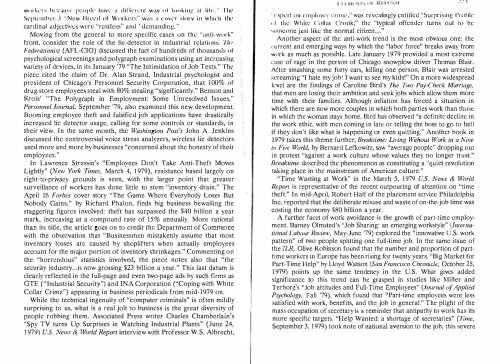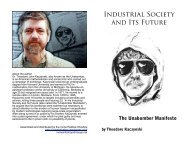CONTENTS - ouroboros ponderosa
CONTENTS - ouroboros ponderosa
CONTENTS - ouroboros ponderosa
Create successful ePaper yourself
Turn your PDF publications into a flip-book with our unique Google optimized e-Paper software.
Wi ll l'rs htTilll.'iC pl'upk havl' a dil"krl'lI! way 01 1(I(li-.ill', til lift-." Th,'<br />
Septemher J "New Brccd of Workns" was a ('Ilvn slory ill which 111('<br />
cardinal adjcctives were "restiess" and "demanding."<br />
Moving from the general to more specific cases on the "anli-work"<br />
front, consider the role of the lie-detector in industrial relations. '17" ,<br />
Federationist (AFL-CIO) discussed the fact of hundreds of thousands of<br />
psychological screenings and polygraph examinations using an increasing<br />
variety of devices, in its January '79 "The Intimidation of Job Tests." Thl'<br />
piece cited the claim of Dr. Alan Strand, Industrial psychologist and<br />
president of Chicago's Personnel Security Corporation, that 100% of<br />
drug store employees steal with 80% stealing "significantly." Benson and<br />
Krois' "The Polygraph in Employment: Some Unresolved Issues,"<br />
Personnel Journal, September '79, also examined this new development.<br />
Booming employee theft and falsified job applications have drastically<br />
increased lie detector usage, calling for some controls or standards, in<br />
their view. In the same month, the Washington Post 's John A. Jenkins<br />
discussed the controversial voice stress analyzers, wireless lie detectors<br />
used more and more by businesses "concerned about the honesty of their<br />
employees. "<br />
In Lawrence Stressin's "Employees Don't Take Anti-Theft Moves<br />
Lightly" (New York Times, March 4, 1979), resistance based largely on<br />
right-to-privaey grounds is seen, with the larger point that greater<br />
surveillance of workers has done little to stem "inventory drain." The<br />
April 16 Forbes cover story "The Game Where Everybody Loses But<br />
Nobody Gains," by Richard Phalon, finds big business bewailing the<br />
staggering figures involved: theft has surpassed the $40 billion a year<br />
mark, increasing at a compound rate of 15% annually. More rational<br />
than its title, the article goes on to credit thc Department of Commerce<br />
with the observation that "Businessmen mistakenly assume that most<br />
inventory losses are caused by shoplifters when actually employees<br />
account for the major portion of inventory shrinkages." Commenting on<br />
the "horrendous" statistics involved, the piece notes also that "the<br />
security industry .. .is now grossing $23 billion a year." This last datum is<br />
clearly reflected in the full-page and even two-page ads by such firms as<br />
GTE ("Industrial Security") and INA Corporation ("Coping with White<br />
Collar Crime") appearing in business periodicals from mid-1979 on.<br />
While the technical ingenuity of "computer criminals" is often mildly<br />
surprising to us, what is a real jolt to busincss is the great diversity of<br />
people robbing them. Associated Press writer Charles Chamberlain's<br />
"Spy TV turns Up Surprises in Watching Industrial Plants" (June 24,<br />
1979) U.S. News & World Report interview with Professor W.S. Albrecht,<br />
,<br />
•<br />
,<br />
"('XI'"rt "II rII1I' I IIVI,[, nillll:," was revealingly cntitlcli "Surrrising I'rofile<br />
" I' the White ('"lIar Crook;" the "typical offendr turns out to he<br />
""Heone just like the normal citizen .... "<br />
Another aspect of the anti-work trend is the most obvious one: the<br />
,'urrent and emerging ways by which the "labor force" breaks away from<br />
work as much as possible. Late January 1979 provided a most extreme<br />
rase of rage in the person of Chicago snowplow driver Thomas Blair.<br />
Aftcr smashing some forty cars, killing one person, Blair was arrested<br />
screaming "I hate my job! I want to see my kids!" On a more widespread<br />
level are the findings of Caroline Bird's The Two Pay-Check Marriage,<br />
that men are losing their ambition and seek jobs which allow them more<br />
time with their families. Although inflation has forced a situation in<br />
which there are now more couplcs in which both parties work than those<br />
in which the woman stays home, Bird has observed "a dcfinite dccline in<br />
the work ethic, with mcn coming in late or telling the boss to go to hell<br />
if they don't like what is happening or even quitting." Another book in<br />
1979 takes this theme further; Breaktime: Living Without Work in a Nine<br />
to Five World, by Bernard Lefkowitz, saw "average peoplc" dropping out<br />
in protest "against a work culture whose values they no longer trust."<br />
Breaktime described the phenomenon as constituting a "quiet revolution<br />
taking place in the mainstream of American culture."<br />
"Time Wasting at Work" in the March 5, 1979 u.s. News & World<br />
Report is representative of the recent outpouring of attention on "time<br />
thef!." In mid-April, Robert Half of the placement service Philadelphia<br />
Inc. reported that the deliberate misuse and waste of on-the-job time was<br />
costing the economy $80 billion a year.<br />
A further facet of work avoidance is the growth of part-timc employ<br />
ment. Barney Olmsted's "Job Sharing: an emerging workstyle" (Interna<br />
tional Labour Review, May-June '79) explored the "innovative U.S. work<br />
pattern" of two people splitting one full-time job. In the same issue of<br />
the ILR, Olive Robinson found that the number and proportion of part<br />
time workers in Europe has been rising fo r twenty years. "Big Market for<br />
Part-Time Help" by Lloyd Watson (San Francisco Chronicle, October 25,<br />
1979) points up the same tendency in the U.S. What gives added<br />
significance to this trend can be grasped in studies like Miller and<br />
Terborg's "Job attitudes and Full-Time Employees" (Journal of Applied<br />
Psychology, Fall '79), whieh found that "Part-time employees were less<br />
satisfied with work, benefits, and the job in general." The plight of the<br />
mass occupation of secretary is a reminder that antipathy to work has its<br />
more specific targets. "Help Wanted: a shortage of secretaries" Clime,<br />
September 3, 1979) took note of national aversion to the job, this severe<br />
, , \






